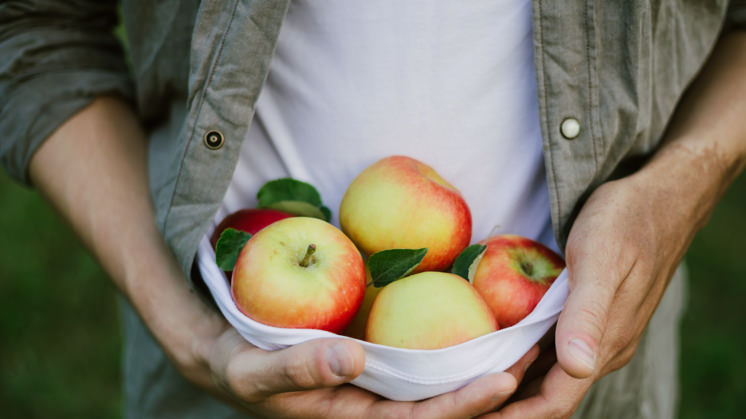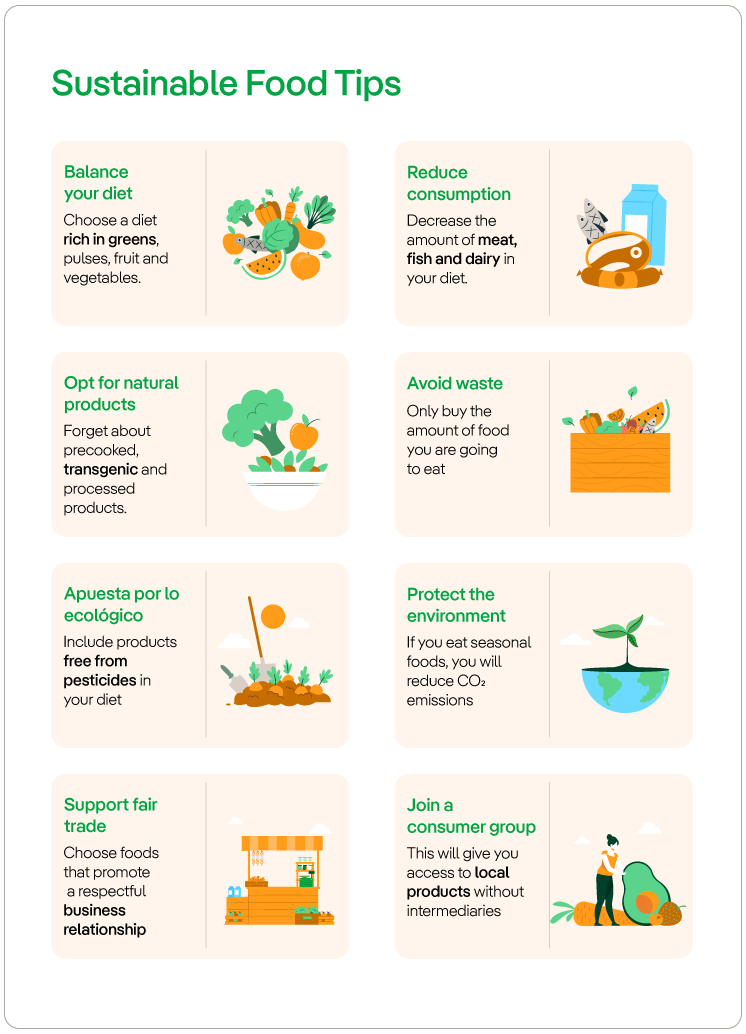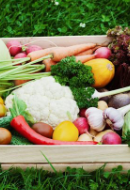What is sustainable food?
Food sustainability, a recipe against pollution
We are what we eat and maintaining a sustainable diet reinforces our commitment to the environment. This type of healthy eating is rich in vegetables, encourages the consumption of local products, generates less waste and limits the consumption of meat and fish to protect biodiversity.

Almost all of us strive to eat in a healthy and balanced way, but do we know how our diet affects social welfare and the health of the planet? Many of the foods we eat may be delicious, but they may also be unsustainable for the environment, the economy and the socio-cultural reality of the countries they are grown in.
Impact of food on the environment
Food production leaves a rather bad taste in your mouth. The United Nations (UN) estimates that the food industry is responsible for 30% of global energy consumption and 22% of the gases that cause global warming. Livestock alone accounts for 14% of these global emissions, as Greenpeace pointed out in a 2018 report on food sustainability. The Food and Agriculture Organization (FAO) has calculated that by 2050 there will be over 9 billion human beings on the planet and that we will need to produce 60% more food.
The seas are also suffering the consequences of an irresponsible diet. Overfishing to meet the demand for fish leads to the degradation of biodiversity and marine ecosystems. In 2020, fish production already reached more than 200 million tonnes, with 20.2 kg per capita destined for human consumption, double the 1960 figure of 9.9 kg per capita. This has meant that only 64.6% of species are now sustainable within the marine ecosystem.
Health is the other great victim of our diet. The current food system is harmful and diseases such as obesity appear linked to the consumption of animal products, refined grains and sugar. In a recently published study, Greenpeace has stated that diets lacking in vegetables, fruits and whole grains cause one in five deaths worldwide and represent one of the most common risk factors for developing diseases and premature deaths.

 SEE INFOGRAPHIC: Tips for sustainable food [PDF] External link, opens in new window.
SEE INFOGRAPHIC: Tips for sustainable food [PDF] External link, opens in new window.
Advantages of a sustainable food system
An increasing number of countries, including Germany, Brazil and Sweden, are including food sustainability in their food policies and educational guides for the consumer, as recommended by the FAO. The following are, according to the FAO, some of the benefits of a sustainable diet:
 Acts against climate change
Acts against climate change
Global emissions of greenhouse gases would fall by 64% by 2050 if we reduced the production and consumption of animal-based foods by 50%.
 Protects forests
Protects forests
Sustainable food production would prevent deforestation by dedicating less land to livestock. Currently, livestock farming is the main cause of deforestation in the Amazon, accounting for 75% of the reduction of this green lung.
 Improves health and contributes to food security
Improves health and contributes to food security
A more sustainable diet would prevent 11 million premature deaths, according to a 2019 study published in the scientific journal The Lancet.
 Encourages the survival of threatened species
Encourages the survival of threatened species
Between 20% and 40% of the mammals and birds that could become extinct by 2060 would have an improved chance of surviving. 24,000 of the 28,000 species at risk of extinction are at least partly due to agriculture and livestock farming, i.e., 86% of all endangered species.
 Preserves water resources
Preserves water resources
With a more sustainable diet, less water would be used and the pollution of rivers and coastal areas due to livestock or the cultivation of animal feed would be reduced.
Ecological agriculture and artisanal fisheries
Organic farming is a way of responsible farming capable of producing enough food for the entire population while minimising environmental damage. This activity can be combined with more sustainable livestock farming, where the animals are raised respectfully and without suffering. Even so, to achieve food sustainability it is essential that we reduce meat consumption and food waste.
In order to support this type of agriculture, the European Union has increased the legislation to receive the organic label, which now has to pass more controls, but helps small farmers to change their model, also increasing the barriers for foreign products to enter the European market.
The fishing industry, for its part, should opt for methods that protect marine ecosystems and favour large-scale employment, such as low-impact artisanal fishing. For this to happen, governments must promote policies that guarantee the right of these fishermen and their communities to meet their basic nutritional needs.

Unpackaged food
Is shopping for loose products the solution to reducing our use of plastics?

Organic products
Ten things you need to know about organic products.

Responsible consumption
Five of the most harmful habits for the health of our planet.

Food of the future
What will we be eating in 2050? Health and sustainability will go hand in hand.
Circular economy model at the Iberdrola Group
At Iberdrola, we work to be more respectful of nature in our three strategic sustainability areas: climate action, biodiversity protection, and circular economy.
For this reason, our sustainable business model is based on the circular economy model, a system for making the most of resources in which priority is given to reducing the use of new raw materials through efficiency in processes, product life extensions, and a firm commitment to the reuse and recycling of materials.




